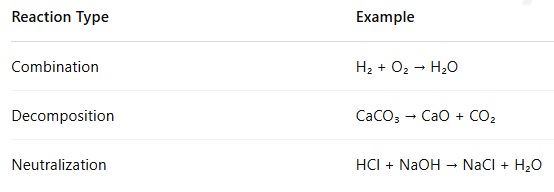
~~~~~~~~~~~~~~~~~~~~~
In Grade 10, students face the challenge of mastering science and technology subjects while preparing for board exams. Student notes of physics, biology, chemistry, and computer science help make learning easier, structured, and more effective. These notes are not just for exam preparation but also to build a strong conceptual foundation for higher studies.
In Grade 10, students face the challenge of mastering science and technology subjects while preparing for board exams. Student notes of physics, biology, chemistry, and computer science help make learning easier, structured, and more effective. These notes are not just for exam preparation but also to build a strong conceptual foundation for higher studies.
Creating and using organized notes can transform how a student learns.
They summarize complex topics into understandable bits.
Enable focused study during revision time.
Reduce the time spent searching for concepts across textbooks.
Notes include important questions, keywords, and diagrams that are frequently asked in board exams.
Well-structured notes aid memory retention, especially when they include diagrams, formulas, and examples.
Physics in Grade 10 covers various real-world phenomena explained through laws, formulas, and logic.
Laws of reflection and refraction
Mirror and lens formulas
Applications: Human eye, microscopes, telescopes
Structure and function of the eye
Persistence of vision
Atmospheric refraction: Rainbows, mirages
Electric current and circuit diagram
Ohm’s Law: V = IR
Series and parallel circuits
Heating effect of electric current
Magnetic field lines
Right-hand rule, electric motor, and generator
Domestic circuits and safety
Conventional vs Non-conventional sources
Solar, wind, and hydro energy
Environmental consequences

Include labeled diagrams of circuits, lenses, and magnetic fields.
Biology teaches about life processes and living organisms, from cells to ecosystems.
Nutrition (Autotrophic & Heterotrophic)
Respiration: Aerobic vs Anaerobic
Excretion and Human Excretory System
Nervous system: Brain, spinal cord
Hormones and endocrine glands
Plant responses: Phototropism, geotropism
Asexual reproduction: Binary fission, budding
Sexual reproduction: Human and plant systems
Mendel’s experiments and traits
Evolution theories and fossil records
Ecosystems and food chains
Ozone layer and pollution
5 Rs: Reduce, Reuse, Recycle, Refuse, Repurpose
Key diagrams:
Human digestive and excretory systems
Brain and neuron
Plant reproductive organs
Chemistry introduces the composition, structure, and changes of matter.
Types of reactions: Combination, decomposition
Reactants, products, and balancing equations
pH scale and indicators
Neutralization reactions
Common examples: Baking soda, washing soda
Physical and chemical properties
Reaction with water, acids, and oxygen
Uses and alloys
Covalent bonding and hydrocarbons
Functional groups: Alcohols, ketones
Soap and detergent formation
Mendeleev’s and Modern Periodic Table
Trends: Atomic size, valency, metallic character
Examples:

Include activity-based experiments from the NCERT textbook.
Computer science provides digital skills for academic and professional life.
Hardware vs Software
Input, processing, and output cycle
LAN, WAN, and internet protocols
Network devices: Routers, switches
Fields, records, and tables
Use of DBMS in real-life applications
HTML tags and structure
Creating simple web pages
Cyber safety: Phishing, passwords, antivirus
Introduction to Artificial Intelligence
Smart devices and sensors
Cloud storage and its benefits
Provide sample HTML code:

Use highlighters for keywords
Insert diagrams in margins
Summarize every page in one line
Revise notes weekly
Make flashcards for formulas and definitions
Explore these platforms for top-quality notes:
BYJU’S Learning App
Vedantu Grade 10 Notes
YouTube channels like “Physics Wallah” and “Unacademy”
Q1. Where can I get free downloadable notes for Grade 10 Science?
Visit ePathshala, BYJU’S, or Vedantu for reliable free resources.
Q2. How do I make my notes more effective?
Use bullet points, diagrams, and headings. Keep notes short but informative.
Q3. Are board exam questions based on NCERT notes?
Yes, most questions in CBSE and state boards are derived from NCERT textbooks and their notes.
Q4. Can I study only from notes and skip textbooks?
Notes are ideal for revision, but initial learning should always involve textbooks.
Q5. How to prepare for science practical exams?
Make a separate notebook with all experiments, diagrams, and observations.
Q6. What should I include in computer science notes?
Include definitions, basic codes, networking terms, and hardware/software distinctions.
Student notes of physics, biology, chemistry, and computer for Grade 10 are vital tools in achieving exam success. Organized, well-structured notes support smart study habits and provide quick access to all essential concepts. Start making or downloading your notes today and take the first step toward excelling in your board exams.